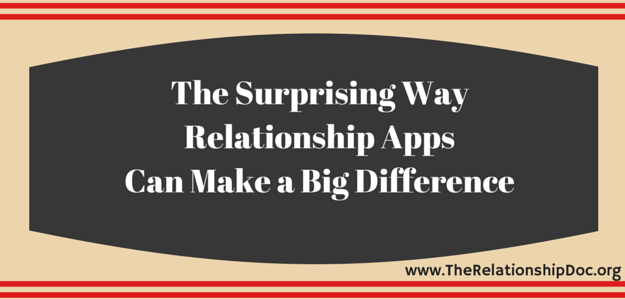 Apps of all kinds are out there for almost anything you can dream up. Relationship apps are yet another technology advancement that have the potential to enhance and improve your life; specifically, your intimate relationship. All are designed to strengthen and maintain your connection with your partner. There are apps that keep track of your finances, create budgets, and help you save for your future together. There’s another that establishes lists for a couple to share, such as a grocery store list, where items can be added or deleted for your partner’s immediate viewing in order to avoid duplicate purchases.
Apps of all kinds are out there for almost anything you can dream up. Relationship apps are yet another technology advancement that have the potential to enhance and improve your life; specifically, your intimate relationship. All are designed to strengthen and maintain your connection with your partner. There are apps that keep track of your finances, create budgets, and help you save for your future together. There’s another that establishes lists for a couple to share, such as a grocery store list, where items can be added or deleted for your partner’s immediate viewing in order to avoid duplicate purchases.
Not surprisingly, the most popular relationship apps focus on one’s sex life, where the goal is to enhance the intimacy in your relationship. These apps create a social network just for the two of you. Some are designed to help you share and store memories. You can document your entire relationship together, updating as needed. “Love Maps” is an app developed by Drs. John and Julie Gottman, who are famous relationship researchers who founded the Gottman Institute. This app assists you and your partner in learning more about each other’s inner world, from daily life experiences to personal hopes and dreams for the future. Knowing and understanding more about your significant other, and his or her preferences, is an important way to strengthen your relationship.
Another example of how apps can improve relationships is by acting as a buffer between partners in conflict. One app called “Fix a Fight” has a “self-soother” feature that is invaluable. It can help couples take a step back and regain their composure, before returning to a heated or controversial issue they may be struggling with at the time. Fix a Fight also uses humor to help diffuse anger, which can be another invaluable tool to help couples calm themselves when in conflict.
Other apps can even help you decide where to go on a date, or recommend conversation starters, and suggest ideas or options you might not otherwise consider. Apps may assist partners in identifying their feelings, deepen their intimate connection, restore calm, and work through conflict. They can encourage thoughtful and meaningful communication.
In my experience, couples who are motivated to try these apps show they are willing and want to make the all-important effort at improving their relationship. This motivation to work on their relationship may, in fact, be much more valuable than any one relationship app. In my practice, I’ve continually seen how a couple’s motivation level can easily become the difference between a largely stagnant and dissatisfying relationship that is “going through the motions,” and one that is flourishing, or at least one in which a couple is continuously striving to enhance their relationship.
The reality is that apps are an inexpensive (and often free) way to work on improving a relationship, and are significantly cheaper than attending couples counseling. While I think they can assist with some of the basic issues couples may be experiencing, using apps is not a substitute for professional counseling.
So, is utilizing relationship apps a good way for a couple to spend their (sometimes limited) quality time together? In my opinion, relationship apps can serve as helpful tools and are a decent choice for motivated couples in some situations. However, they certainly do have limitations. Apps are not able to guide partners in gaining insight into their underlying relationship dynamics, or help examine the feelings behind those emotional buttons that are repeatedly pushed. The use of certain apps (such as Love Maps) can be helpful for partners to use between therapy sessions. Their couples counselor could utilize specific apps and incorporate them as homework assignments.
Overall, experimenting with relationship apps is certainly worth a try. If you find one that helps, keep using it! If not, it may be important to seek professional help, to ensure you’re taking all possible steps to maximize the quality of your relationship.